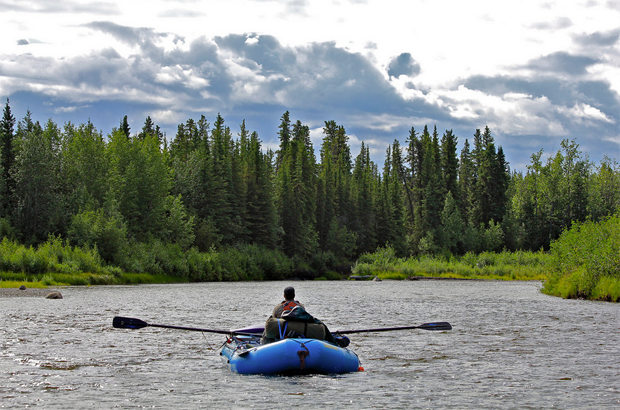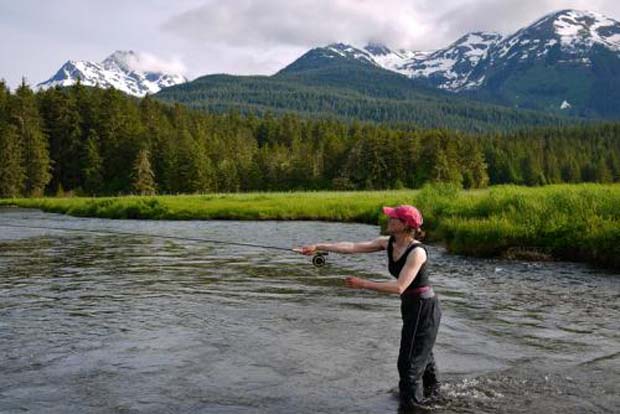. . . not tin-hat Bundy thugs.
It is Open Season on Your Land and Water
By Ted Williams / Fly Rod & Reel
[dropcap]I[/dropcap] can’t recall a time when western politicians and the extractive industries that fund them weren’t having temper tantrums about federal land management, and proclaiming that they were going to seize property belonging to the American public.
Virtually every high-quality trout and salmon stream in the nation has its headwaters on public land that belongs to you, not the states that want to sell the land to developers.
The current mantra from the West sounds like the Sagebrush Rebellion, Wise Use Movement and County Supremacy all over again – a Groundhog Day of heist talk. So it’s easy to dismiss the current noise as sound and fury signifying nothing. That would be a mistake.
Now, with Republican control of Congress, the land grabbers’ prospects are brighter than they’ve ever been. State seizure of public lands is a plank in the GOP platform. A 2014 resolution, entitled “In Support of Western States Taking Back Public Lands [as if it had them originally]” reads as follows: “RESOLVED, That the Republican National Committee calls upon all national and state leaders and representatives to exert their utmost power and influence to urge the imminent transfer of public lands to all willing western states.”
Lots less fishing and hunting is what state ownership of federally managed land would mean for you. An enormous amount of fish and wildlife habitat would be destroyed, and you would be denied access to a good deal of whatever was left. Reforms sportsmen have worked so hard for would vanish. Western politicians, state and federal, want to punch America back past the Wilderness Act of 1964, past the Multiple Use-Sustained Yield Act of 1960, past the Federal Aid in Sport Fish Restoration Act of 1950, past the Federal Aid in Wildlife Restoration Act of 1937, past the Migratory Bird Hunting and Conservation Stamp Act of 1934, even past 1903, when Theodore Roosevelt started the National Wildlife Refuge System.

The Gulkana is one of the most popular sportfishing rivers in Alaska, providing rich habitat for rainbow trout, arctic grayling and king salmon. This is your public land, not Alaska’s to sell to a mining corporation. If you want to keep it – step up to the plate! Image www.flickr.com
As a condition for entering the union, Arizona, Colorado, Idaho, Montana, New Mexico, Oregon, Utah, Washington, Wyoming and Nevada agreed to disclaim all legal right and title to unappropriated public lands within their borders. But this is a fact that hopeful land grabbers don’t want to know and don’t want you to know. So they’ve hatched or proposed unconstitutional bills promoting seizure of lands belonging to the American public. Thirty-seven of these bills were actually introduced in 2015. Utah’s legislature has even appropriated $2 million to cover legal expenses and establish the “Utah Land Commission” that will supposedly oversee the process of seizing public property.
The land-grab effort is not about state management. It’s about profiteering. Once western states had relinquished all claims on federal lands and been admitted to the union as a result, the federal government gave them “trust lands” with which to generate revenue for schools and other public institutions via mining, logging, oil and gas extraction, and sale of the land itself. States are required by their own laws to balance budgets, so any additional land they might acquire would be treated like trust land. They’ve already hawked a lot of it. Nevada, for example, was given 2.7 million acres and now has but 3,000. If Nevada annexes federally managed lands within its borders, it will be required by its constitution to generate revenue for its Permanent School Fund by selling them off or by hacking out their minerals, oil, gas and timber.
The main purpose of state lands has been and will be revenue production. For you, in a lot of cases, that has meant Keep Out. And in a lot of cases it has meant death for fish and wildlife. In Colorado, for instance, you can fish and camp on virtually all federal land; you can hunt on most. You cannot hunt, fish or camp on most state land because it’s predominantly reserved for extractive industry.
There are federal programs to expand public access, none more successful than the Land and Water Conservation Fund (LWCF), by which America has reversed an ancient process by turning fossil fuels back into plants and animals. A portion of royalties collected from extractors of offshore oil and gas, among the worst degraders of public assets, goes back to the public for restoring and protecting fish and wildlife habitat. LWCF grants have helped protect seven million acres. Interestingly enough, the same politicians who have been fighting this allocation are leading the land-grab charge. Attempting to divert LWCF revenue from habitat, Energy and Natural Resources chair Sen. Lisa Murkowski (R-AK) instructed her Senate colleagues to “shift the federal focus away from land acquisition” toward “resources that we have”; i.e., maintenance of buildings, roads, curbsides, trails, etc.
“What’s most disturbing to me,” remarks Dr. Steve Williams, president of the Wildlife Management Institute and former director of the US Fish and Wildlife Service, “is that this isn’t just about transferring public land to states. It’s also about transferring it to counties, cities, towns and, in the minds of some, private interests. Access is a big issue; but it’s the headwaters of these great western rivers that may be of development interest if we open them to the highest bidder . . . . How can a city or town have the resources to manage a forest, say for water supply, better than the US Forest Service? You’d have access issues, maybe stream-degradation issues. The Forest Service has its mission, a city or town has a different mission. Finally, there wouldn’t be any open discussion. Most states don’t have anything like the National Environmental Policy Act [that requires environmental review and public input].”
The land-grab effort is being goosed along by the American Lands Council, run by Utah state Rep. Ken Ivory (R-West Jordan). Ivory barnstorms the West proclaiming that the feds have no right to manage public land, and whooping it up for state takeover. The Campaign for Accountability has filed complaints with the attorneys general of Utah, Arizona and Montana, requesting an investigation of Ivory for engaging in “an illegal scheme to defraud local government officials out of taxpayer funds [by] falsely claiming the federal government can be forced to transfer public lands to the states.” The Campaign reports that “more than 50 percent of the organization’s most recent budget was spent enriching Rep. Ivory and his wife.”
The states are well aware that their land-grab bills can’t trump federal law, but that was never the purpose. The Center for American Progress accurately defines them as “corporate-backed messaging tools that can be traced to conservative front groups such as the American Legislative Exchange Council and Americans for Prosperity.” In the newly conservative Congress, those messages are being heard.
What sportsmen and other fish-and-wildlife advocates need to worry about is federal legislation. “Congress could pass a law tomorrow that would transfer national forests and national wildlife refuges to state control,” warns Matt Lee-Ashley, public lands director for the Center for American Progress. He cites House and Senate passage in March of a joint, nonbinding budget resolution to do exactly that, offered by Lisa Murkowski.
Rep. Mark Amodei (R-NV) introduced a bill that would allow his state to seize and sell public lands. Presidential candidate Sen. Ted Cruz (R-TX) introduced an amendment to last year’s Sportsmen’s Act that would have prohibited the federal government from owning more than half the land within one state. Rep. Rob Bishop (R-UT), chair of the House Natural Resources Committee, has filed a budget request for $50 million of your tax money to facilitate immediate state confiscation of your lands. And Sen. James Inhofe (R-OK) introduced the Federal Land Freedom Act of 2015, which would transfer to the states management of energy production on millions of acres owned by all Americans.
“The logic behind [Inhofe’s] bill,” explains Whit Fosburgh, president and CEO of the Theodore Roosevelt Conservation Partnership (TRCP), “is that energy production should be the dominant use of public lands, and that literally every barrier should be removed to make sure that production occurs quickly and with little regard for fish and wildlife habitat or access . . . . The notion that underlies this bill, and many of the other land transfer ideas we’ve seen in recent months, is that these federal lands that have not been industrialized are ‘unused’ or ‘underutilized’ . . . . As any sportsmen can attest, the notion that if an area is not industrialized means it is unused is nonsense, and likely spoken by someone who has never left the comfort of his or her vehicle to experience our public lands.”
If you doubt what the land grabbers would do, consider what they have done. Ronald Reagan hired James Watt, a professional privatizer from the Mountain States Legal Foundation, to run the Interior Department. George W. Bush hired a quieter – and therefore more dangerous—privatizer, Gale Norton (Watt’s protégé at the Foundation).
Watt and Norton turned the oil and gas industry loose on Bureau of Land Management and Forest Service units, basically suspending the Clean Water Act, Clean Air Act, Safe Drinking Water Act, Migratory Bird Treaty Act and Endangered Species Act. Huge swaths of your fish-and-wildlife habitat were converted to private industrial parks. Speaking to the Green River Cattlemen’s Association, in Pinedale, Wyoming—later to become ground zero for the oil-gas blitz—Watt declared: “If the trouble from environmentalists cannot be solved in the jury box or at the ballot box, perhaps the cartridge box should be used.”
Find out more about this new generation of aspiring land grabbers . . .
About Ted Williams
In July 2015, the Outdoor Writers Association of America named Ted Williams the nation’s best outdoor columnist, presenting him with its overall “Excellence in Craft Award” for his final three “Incite” columns in Audubon. The column ran from September 1988 until May 2014. You can read more of Ted William’s on his blog .
NOTE: Featured Image is was taken in Tongass National Forest, Alaska by Joseph (Flickr).


